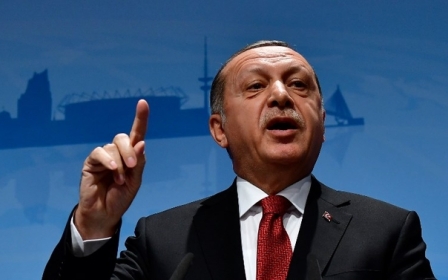Iraqi PM promises to defend Kurds against any attack

Iraq's prime minister, Haider al-Abadi, on Saturday said he would defend the country's Kurds from attack as internal and regional tensions soared over a controversial independence referendum.
"To our people in the Kurdistan region: we defend our Kurdish citizens as we defend all Iraqis and will not allow any attack on them," he tweeted in English.
An Abadi adviser, who asked to remain anonymous, told AFP that the premier was referring to either an internal or external attack. "We will not allow any harm to you and we will share our loaf of bread together," Abadi said in another tweet.
Abadi also pressed the case for the central government in Baghdad to receive the income from Kurdistan's oilfields, saying the money would be used to pay Kurdish civil servants.
Seeking to control the oil income from the autonomous Kurdish region is central to Abadi's strategy after the Kurdish referendum on independence held on Monday.
The Kurdistan Regional Government said it plans to use the vote, which delivered an overwhelming yes for independence, as a mandate to seek the peaceful secession of the Kurdish region through talks with Abadi's government.
Abadi, who rejects any talks with the Kurds on independence, wrote in a tweet: "Federal government control of oil revenues is in order to pay KR (Kurdistan Region) employee salaries in full."
No other statement was forthcoming from the government. It was not clear whether Baghdad had had any success in taking control of oil income from the Kurdish region in the north of Iraq, which for years has kept oil revenue and paid Kurdish civil servants.
Abadi on Thursday said Turkey had told Iraq it would deal only with the Iraqi government on crude oil exports. Iraqi Kurdish crude oil is exported to world markets through a pipeline to Turkey's Mediterranean coast.
In 2014, after a dispute over oil exports, Baghdad suspended payments to the Kurdish region of 17 percent of Iraq's national budget.
Wages, including those of Kurdish Peshmerga fighters, were slashed after the end of those transfers, which were worth around $12bn annually and made up 80 percent of the region's budget revenues.
Iran on Saturday said it would hold a joint military exercise with Iraq on Iran's border with Iraqi Kurdistan in response to Monday's "illegitimate referendum".
Iraqi soldiers on Tuesday also took part in a Turkish military drill close to the Iraqi frontier.
Inside Iraq, Hadi al-Ameri, head of the powerful Iran-backed Badr organisation, has vowed to defend the country's unity, warning that the poll could trigger civil war.
Baghdad has demanded the annulment of Monday's non-binding referendum, which resulted in a huge "yes" vote, and has suspended international flights to and from the region.
Washington has said it does not recognise the "unilateral" referendum.
Turkey, Iran and Syria - which have their own sizeable Kurdish communities - have also rejected the vote for independence in the oil-rich region.
Stay informed with MEE's newsletters
Sign up to get the latest alerts, insights and analysis, starting with Turkey Unpacked
Middle East Eye delivers independent and unrivalled coverage and analysis of the Middle East, North Africa and beyond. To learn more about republishing this content and the associated fees, please fill out this form. More about MEE can be found here.




